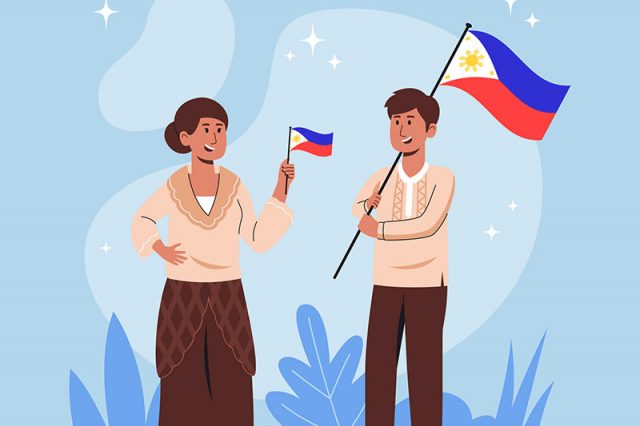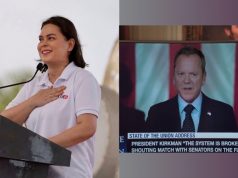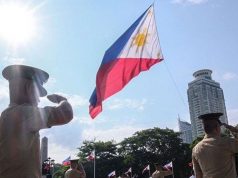Studying the Philippine Constitution for nationalism?
This was what Sen. Jinggoy Estrada, chairperson of the Senate Committee on National Defense and Security, Peace, Unification and Reconciliation, said after filing a bill about mandating its study.
The lawmaker last November filed Senate Bill 1443 or the Mandatory Constitutional Education Act which integrates the teaching of the 1987 Philippine Constitution to junior and senior high school students of private and public schools.
The bill seeks to develop a Constitutional Education course for students to supposedly teach them about democratic values, people’s participation in government “and equip them with the knowledge of the Constitution that they can use in their analysis and involvement in public issues.”
Estrada said the Constitutional Education course framework will include topics — but not limited to — the following:
- History and overview of the 1987 Constitution
- Nationalism and sovereignty
- State principles and policies
- National territory
- Government branches, institutions, and processes
- Citizens’ rights and duties
- National economy and patrimony
- Citizenship and suffrage
- Democractic values, social justice and human rights
- Active citizenship and people’s participation in governance
- Education, science and technology, arts, culture and sports
- Current issues
Teachers will also be trained to teach the curriculum to secondary students.
Estrada in his explanatory note cited Article XVI Section 3 of the 1987 Constitution, which said that educational institutions “shall include the study of the Constitution as part of the curricula.”
He also said the Senate bill will strengthen the “fundamentals of nationalism and patriotism which will be engrained in the inclusion of constitution in the curriculum for secondary levels.”
“A nationalist mindset must be instilled in Filipino learners who will contribute to a strong Philippine economy, grounded in their commitment to the nation,” the lawmaker commented.
Currently, the Araling Panlipunan (social studies) curriculum in basic education (from Kindergarten to Grade 10), includes lessons on the 1987 Constitution, as well as on the rights and responsibilities of citizens.
It also tackles government authority and democracy.
“Understanding the concepts of authority and leadership and the different levels and aspects of government, including the heavy responsibility of being a leader are discussed in the AP curriculum,” the Department of Education‘s guide on Araling Panlipunan reads in Filipino.
Meanwhile, Estrada’s intention for the Constitution to instill a “nationalist mindset” raised the eyebrows of some Filipino online users.
“To ‘instill a nationalist mindset’ tapos may mga kurakot at lapastangang mga nasa gobyerno?” a Twitter user asked in response to the reports.
“Nationalist mindset tapos puro mandarambong nakaupo,” another online user commented.
“Best way to improve that mindset is to teach the correct history and its implications in schools so that they won’t flip to believing fake news when they grow up,” wrote a different Pinoy.
On loving the country
Nationalism is defined by Grammarist as “the love and affection one feels for his country.”
The grammar website, however, also noted that the belief “is rooted in the belief that one’s country is superior to all others.”
It added that the term “carries the connotation of disapproval of other nations or a rivalry with other nations.”
An entry from the Oxford Research Encyclopedias explains that nationalism is an ideology.
In discussing one’s love for the country, another term always arises — patriotism. This is also defined by Grammarist as “the love and affection one feels for his country.”
It is “based on the belief in the inherent goodness of the system of government in a country, and the goodness of its people.”
In Oxford’s entry, patriotism “is neither an ideology nor a form of politics.”
It further explained that it is “understood as an emotion or a character trait.”
The Grammarist emphasizes the difference between the terms with the following remarks:
“While patriotism does not disparage other countries, nationalism builds up one’s own country by tearing other countries down. Nationalism supports dominating other countries.”
An article from the International Journal of Education & Literacy Studies also notes the following:
“While nationalism emphasizes a unity of cultural past with inclusion of the language and heritage, patriotism is based on love towards people with a greater emphasis on values and beliefs.”
The article said that nationalism “may not be held separate from the wish of ruling.” It continued:
“The unchanging purpose of every single nationalist is to provide more power and reputation for his nation rather than himself.”
“Nationalism may have played a crucial part at the initial stages of construction of the nation, but, with the innate selectness being inherent to it, nationalism may be destructive for particularly the nation states of a multiple-ethic structure in the end.”
The article also cited English novelist George Orwell, who commented that patriotism is belonging to a specific place and way of life that are believed to be the best part of the world without a wish to push other people.
ALSO READ: What experts are saying: Role of Filipino language, literature in nationhood










